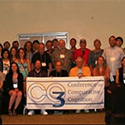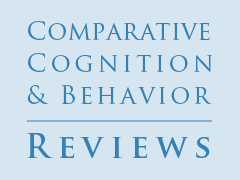 A Social History of the Founding of the Conference on Comparative Cognition and the Comparative Cognition Society
A Social History of the Founding of the Conference on Comparative Cognition and the Comparative Cognition Society
Reading Options:
Continue reading below, or:
Read/Download PDF| Add to Endnote
Ronald G. Weisman
Queen’s University
Mark E. Bouton
University of Vermont
Marcia L. Spetch
University of Alberta
Edward A. Wasserman
University of Iowa
This memoir is a brief history of the founding of the Conference on Comparative Cognition and the Comparative Cognition Society. The text represents the best recollections of the authors, who together founded the Conference. In the 1980s, Ron Weisman visited Melbourne, Florida, regularly to enjoy the warm weather in March and to visit friends at Florida Tech. Over time, he began thinking about sharing the Melbourne experience with other comparative cognition scientists. He discussed the idea with Mark Bouton, Marcia Spetch, and Ed Wasserman in the late 1980s: it is probably no accident that all four taught on campuses that experience harsh winters. By the early 1990s, the group began planning the meetings in earnest. Together, all four became known as the steering committee—or “steers” for short. The steering committee began meeting as a group and in pairs over the next few years to plan the conference. They decided on a name (the Conference on Comparative Cognition), and Ed Wasserman provided the acronym, CO3. Suzy Bouton did the wonderful logo. The committee discussed the lengths of the talks (5, 10, and 20 minutes). Mark Bouton suggested including very short, 5-minute talks, borrowed from the Winter Conference on the Neurobiology of Learning and Memory (Park City, Utah). At CO3, the 5-minute talks evolved into “spoken posters,” complete in themselves, practiced, polished, and informative. Graduate students were allowed to present these brief talks from the beginning, and faculty members were encouraged to do likewise. However, in practice, faculty give 10-minute talks, or, less commonly, 20-minute talks. Other more pragmatic, but important, decisions dealt with providing snacks and drinks at the meetings and when to schedule sessions.
Most important, the steering committee discussed what the meeting was going to be about. They decided that CO3 was to be about comparative cognition in the broadest sense, with encouragement to report on the standard laboratory species and on more naturally occurring species. By defining cognition broadly, they were able to avoid the squabbles then current between more behaviorally oriented and more cognitively oriented scientists.
CO3 first met March 17–20, 1994, at the Holiday Inn on the Ocean in Melbourne. Slightly fewer than three dozen scientists attended, but CO3 was off to a promising start. The attendees liked the meeting, and more than half said they would attend often if not every year. In those early years, more pelicans attended, and more alcohol was consumed.
Noise issues in the normal meeting rooms prompted the hotel to move us to a swank, oceanfront, two-story, glass-walled penthouse. For a time, the luxurious penthouse was perfect for meetings and great evening parties. But eventually rising room rates and noise from the Holiday Inn’s oceanfront entertainment drove CO3 a few miles north to the Hilton Hotel, which served CO3 well until the conference outgrew the limited, but excellent, accommodations. Conveniently, the Radisson Hotel directly up the beach was larger and a better business partner.
While the group met at the Hilton, in 1997, Suzanne MacDonald began to design and sell shirts commemorating the meetings. The designs always gracefully depicted an animal native to Florida. Suzanne joined the steering committee soon thereafter. That the meetings were held in warm, sunny Florida was always important. Mike Brown, later a member of the steering committee, gave the meeting its informal description: “It’s surf and science,” he said with a smile. Melbourne is a relatively quiet town and over the years Mark Bouton and then Marcia Spetch and Suzanne MacDonald sought out other venues; nevertheless, in direct comparisons, Melbourne always offered greater value than better-known towns. Cost has remained important because the meeting attracts so many graduate students.
In 1997, it became obvious that CO3 was growing into what we had all hoped it would become—a successful annual meeting of like-minded scientists. Just to be clear, CO3 was governed by an unelected steering committee, a sort of benign dictatorship. There was no plan for succession. The rapid growth in the number of presenters made it clear that the same few people could not be expected to continue to carry the responsibility, year after year, for a meeting projected to soon include 200+ scientists. At the request of Ed Wasserman, the steering committee met and discussed the next phase: incorporation as a scientific society, the Comparative Cognition Society. The overwhelming majority of presenters favored incorporation, but a few, including a member of the steering committee, did not. Ron Weisman responded to the majority opinion and carried through the incorporation in Florida, where the fees and responsibilities of running a nonprofit corporation are not onerous. We met as a society for the first time in 1999. By that time, we had assembled a rotating cadre of colleagues who worked hard to make sure that the meeting ran smoothly. After incorporation, we set up elected governance to take the Comparative Cognition Society forward into the new century.
Since incorporation, the Society has thrived. Members of the executive board (an expanded and elected version of the steering committee) have included both original members and new faces: Mike Brown, Bob Cook, Jon Crystal, Jeff Katz, Suzanne MacDonald, Marcia Spetch, Ed Wasserman, Ron Weisman, and Tom Zentall. Bob Cook has published two cyber books under the Comparative Cognition Society’s imprint. Ron Weisman and Bob Cook founded and took the first six-year turn editing the Society’s successful online journal, Comparative Cognition and Behavior Reviews. As first suggested by Ed Wasserman, leaders in the field of comparative cognition have been honored with a CCS Distinguished Researcher award, a Master Lecture, and a special issue of Behavioral Processes.
Over the years, CO3 has included talks on over 100 species by scientists from over a dozen countries. Through the political and economic crises of the early 21st century and the Society’s incorporation, attendance at CO3 has grown and remained strong. We are pleased to report that each year brings both returning and new researchers, together with students ready to become the future of our field.
